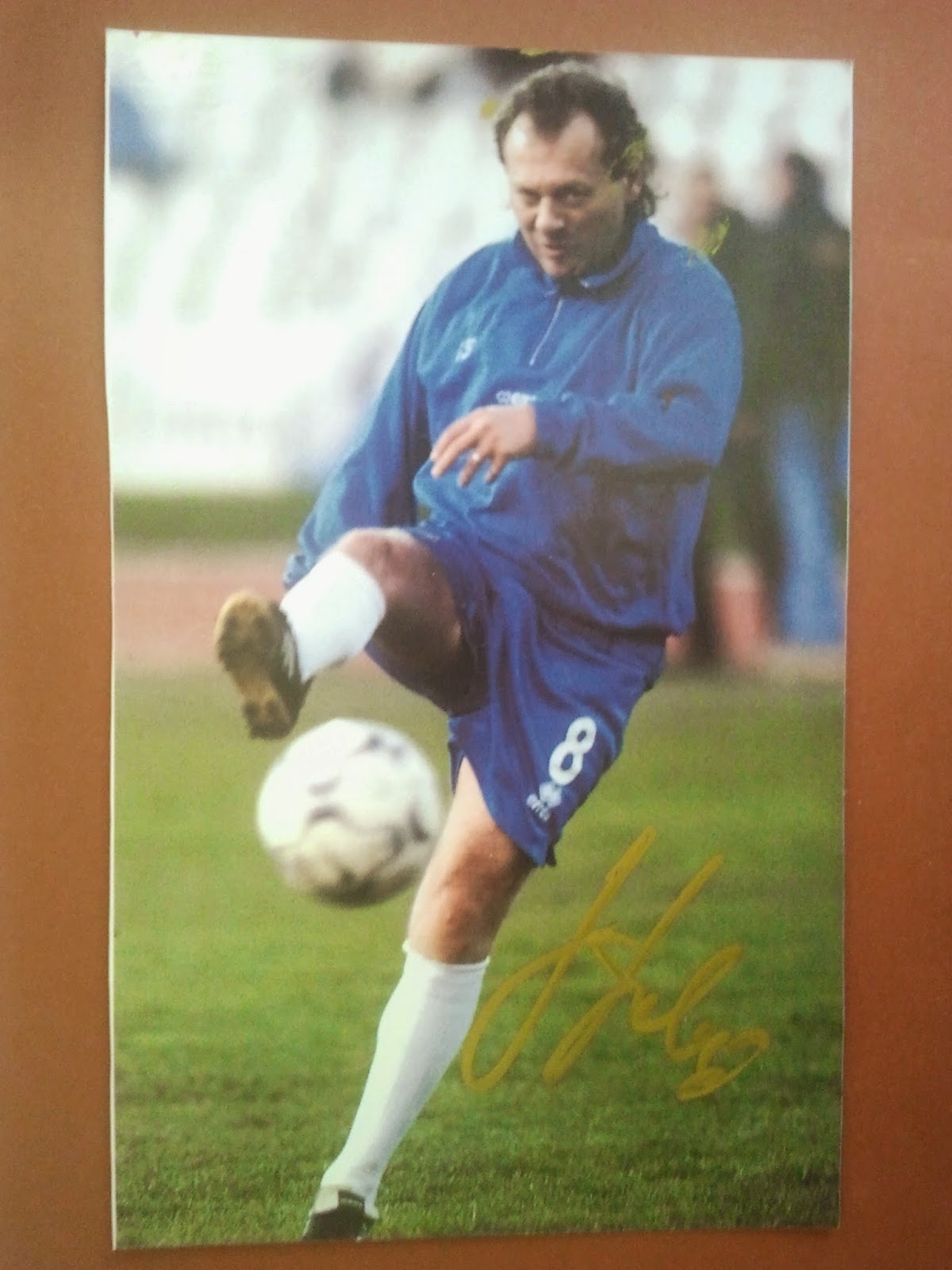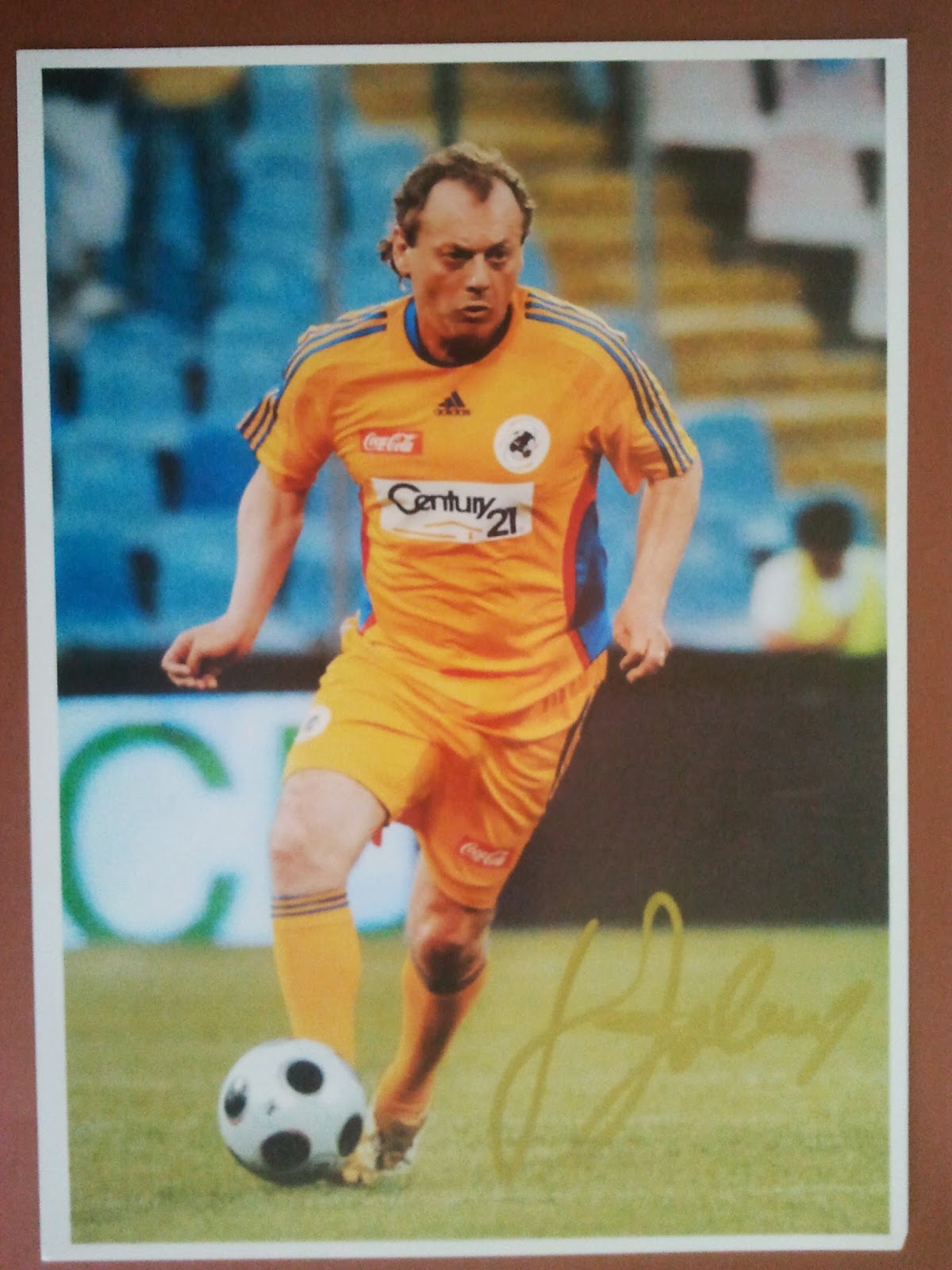
 Papin achieved his greatest success while playing for Olympique Marseille between 1986 and 1992. He later played for AC Milan, FC Bayern Munich, Bordeaux, Guingamp, JS Saint-Pierroise and US Cap-Ferret. Papin also played 54 times for the French national team.
After a short time as manager of French clubs, he joined the local
amateur club AS Facture-Biganos Boïen as a player in 2009, aged 45.
Papin achieved his greatest success while playing for Olympique Marseille between 1986 and 1992. He later played for AC Milan, FC Bayern Munich, Bordeaux, Guingamp, JS Saint-Pierroise and US Cap-Ferret. Papin also played 54 times for the French national team.
After a short time as manager of French clubs, he joined the local
amateur club AS Facture-Biganos Boïen as a player in 2009, aged 45.He was famous for his volley shots that his fans nicknamed "Papinades" from his name.
In 1996, after their eight-month-old daughter Emily was shown to have serious cerebral lesions, Jean-Pierre and his wife, Florence, set up an association "Neuf de Coeur" (Nine of Hearts; Papin's shirt number was 9) to help others in that situation and, particularly, to find and apply methods to mentally and physically educate such children.
Although Papin played only 31 matches for Club Bruges, he was elected as its best foreign player by the supporters in April 2008.
 Papin scored 30 goals for France in 54 matches. He played at the 1986 World Cup finals in Mexico, where France finished third, and at the 1992 European Championships in Sweden. His last game for the national team was in 1995.
Papin scored 30 goals for France in 54 matches. He played at the 1986 World Cup finals in Mexico, where France finished third, and at the 1992 European Championships in Sweden. His last game for the national team was in 1995.At club level, he played for INF Vichy (1983–1984), Valenciennes (1984–1985), Club Brugge (1985–1986), Olympique Marseille (1986–1992), AC Milan (1992–1994), FC Bayern Munich (1994–1996), Bordeaux (1996–1998) and Guingamp (1998).
 During Papin's hugely successful spell at Olympique Marseille, with
the Frenchman as striker and team leader Marseille won four French
league championships in a row (1989–1992), a French league and cup
double in 1989 and reached the final of the European Champions Cup in 1991, losing to Red Star Belgrade
after a penalty shootout. During this period, Papin was the French
league's top scorer for five consecutive seasons (from 1988 to 1992).
While at Marseille he won the Ballon d'or, awarded to Europe's top footballer, in 1991. He is the only player to win this award while playing for a French club.
During Papin's hugely successful spell at Olympique Marseille, with
the Frenchman as striker and team leader Marseille won four French
league championships in a row (1989–1992), a French league and cup
double in 1989 and reached the final of the European Champions Cup in 1991, losing to Red Star Belgrade
after a penalty shootout. During this period, Papin was the French
league's top scorer for five consecutive seasons (from 1988 to 1992).
While at Marseille he won the Ballon d'or, awarded to Europe's top footballer, in 1991. He is the only player to win this award while playing for a French club.In 1992, Papin joined Italian giants AC Milan for a world record fee of £10,000,000, and was the first high-profile French player to join the Italian league since Michel Platini. However, he never established himself as a regular first team member with the rossoneri due to injuries and adaptation problems. He entered as a substitute during the 1993 UEFA Champions League Final where Milan lost to his former club, Marseille. Nevertheless, Papin has kept good memories of his spell in Italy and frequently cites former Milan managers Fabio Capello and Arrigo Sacchi as his models when coaching is concerned. In 1994, he was transferred to Bayern Munich where his season was again plagued by injuries. In his second season in Germany he was part of the side that won the UEFA Cup against Girondins de Bordeaux, a club that Papin would join the following season. With Bordeaux, he lost the final of the 1997 Coupe de la Ligue against Strasbourg. Papin's career ended in 1998 with Second Division side EA Guingamp.
 Papin was a prolific striker on the French scene but, contrary to
many other French great players, never really became dominant abroad. He
was also part of the 'cursed generation' of French players that came
between the Platini era of the 80's and the 1998 world champions
boasting the likes of Zidane, Thuram, Henry and company. Despite some
talented players like Papin, Éric Cantona or David Ginola
the French national team fared disappointingly, missing the 1990 and
1994 World Cups – the later after two humiliating defeats at home
against Israel and Bulgaria – and being ousted in the group stage of
Euro 1992 by Denmark after a perfect record in the qualifications. It
was the only period (1989–1996) in French football where clubs actually
did better than the national team.
Papin was a prolific striker on the French scene but, contrary to
many other French great players, never really became dominant abroad. He
was also part of the 'cursed generation' of French players that came
between the Platini era of the 80's and the 1998 world champions
boasting the likes of Zidane, Thuram, Henry and company. Despite some
talented players like Papin, Éric Cantona or David Ginola
the French national team fared disappointingly, missing the 1990 and
1994 World Cups – the later after two humiliating defeats at home
against Israel and Bulgaria – and being ousted in the group stage of
Euro 1992 by Denmark after a perfect record in the qualifications. It
was the only period (1989–1996) in French football where clubs actually
did better than the national team. Papin was also iconic in French pop culture because of his caricature in the satirical TV puppet show Les Guignols de l'Info.
At first, Papin was depicted as a rather dumb football player (a common
stereotype in France), his only obsession being the many different ways
to score goals. When Papin experienced difficulties in Italy, the
coverage became more sympathetic, especially with the infamous Reviens JPP ! song where even God Himself would urge Papin to come back to his home country, because "France needs you !"
Papin was also iconic in French pop culture because of his caricature in the satirical TV puppet show Les Guignols de l'Info.
At first, Papin was depicted as a rather dumb football player (a common
stereotype in France), his only obsession being the many different ways
to score goals. When Papin experienced difficulties in Italy, the
coverage became more sympathetic, especially with the infamous Reviens JPP ! song where even God Himself would urge Papin to come back to his home country, because "France needs you !"He was twice linked with clubs in England later in his playing career. First, in March 1994, he was a transfer target for Premier League side Tottenham Hotspur. Towards the end of his spell with Bordeaux in 1998, he was a target for ambitious Fulham, then a Division Two (third tier) side, and even expressed his desire to sign for the club. However, neither transfer ever happened and Papin finished his career without having spent any time in England.
After a short time as manager of French clubs, he joined the local amateur club AS Facture-Biganos Boïen as a player in 2009, aged 45.
 In May 2006, Papin took over from Jacky Duguépéroux as the new coach of RC Strasbourg, who were relegated to the Second Division. He had previously been coaching FC Bassin d'Arcachon, an amateur team, and helped them to be promoted from CFA 2 to CFA. In 2006–07, he guided Strasbourg back to Ligue 1
with a third-placed finish but came under pressure shortly after the
end of the season when internal conflicts at the club surfaced in the
press. Several players, including '05 league cup final hero Jean-Christophe Devaux,
also openly criticized Papin's methods. Initially confirmed as manager
for the 2007–08 season, he was forced to resign a week later after it
was revealed that he had interviewed for the vacant managerial job at RC Lens only hours after his confirmation at Strasbourg. He was replaced by Jean-Marc Furlan, former manager of ES Troyes AC, while Lens selected Guy Roux as their new manager. Ironically, Papin eventually became the manager of Lens after the club lost at Strasbourg,
as Roux resigned only five games into the 2007–08 season. In the midst
of the season, Lens and Papin were fighting to avoid relegation to the
Second Division. Lens was also eliminated in the first round of both the
UEFA cup and the Coupe de France by, respectively, FC Copenhagen (1–1; 1–2) and Second Division side Chamois Niortais (0–1, at home). On 29 December 2009, Châteauroux have hired the coach to replace Dominique Bijotat.He left his position in May 2010 and was substituted by Didier Tholot.
In May 2006, Papin took over from Jacky Duguépéroux as the new coach of RC Strasbourg, who were relegated to the Second Division. He had previously been coaching FC Bassin d'Arcachon, an amateur team, and helped them to be promoted from CFA 2 to CFA. In 2006–07, he guided Strasbourg back to Ligue 1
with a third-placed finish but came under pressure shortly after the
end of the season when internal conflicts at the club surfaced in the
press. Several players, including '05 league cup final hero Jean-Christophe Devaux,
also openly criticized Papin's methods. Initially confirmed as manager
for the 2007–08 season, he was forced to resign a week later after it
was revealed that he had interviewed for the vacant managerial job at RC Lens only hours after his confirmation at Strasbourg. He was replaced by Jean-Marc Furlan, former manager of ES Troyes AC, while Lens selected Guy Roux as their new manager. Ironically, Papin eventually became the manager of Lens after the club lost at Strasbourg,
as Roux resigned only five games into the 2007–08 season. In the midst
of the season, Lens and Papin were fighting to avoid relegation to the
Second Division. Lens was also eliminated in the first round of both the
UEFA cup and the Coupe de France by, respectively, FC Copenhagen (1–1; 1–2) and Second Division side Chamois Niortais (0–1, at home). On 29 December 2009, Châteauroux have hired the coach to replace Dominique Bijotat.He left his position in May 2010 and was substituted by Didier Tholot.












